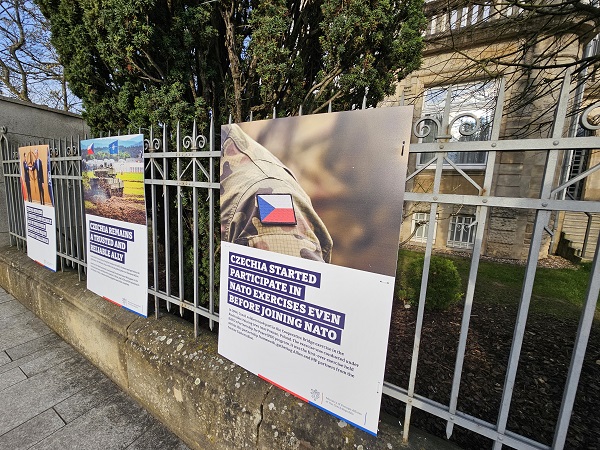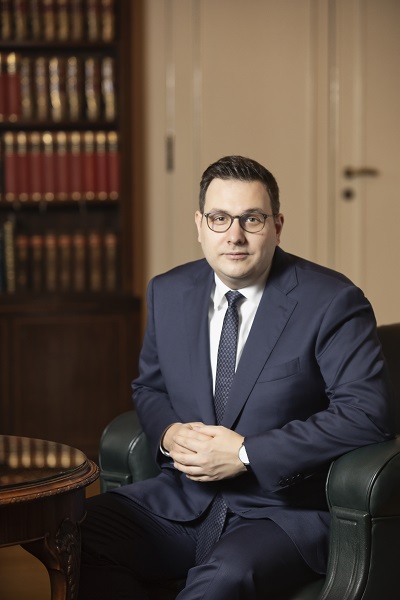 Credit: Embassy of the Czech Republic in Luxembourg
Credit: Embassy of the Czech Republic in Luxembourg
Tuesday 12 March 2024 marks the 25th anniversary of the accession of the Czech Republic, Poland and Hungary to the North Atlantic Treaty Organization (NATO).
To commemorate 25 years of NATO membership, the Embassy of the Czech Republic in Luxembourg has set up an outdoor exhibition on its fence and is launching a social media campaign. The exhibition is open to the public and can be viewed outside the embassy building in Luxembourg-Limpertsberg (2 Rond-point Robert Schuman, L-2525).
Chronicle.lu spoke with both the Minister of Foreign Affairs of the Czech Republic, Jan Lipavský, and the Czech Ambassador to Luxembourg, Vladimír Bärtl, about Czechia's accession to NATO 25 years ago and the continued importance of membership today, particularly in the context of Russian aggression against Ukraine.
Setting the scene for accession back in the 1990s, Ambassador Bärtl explained that "Czechoslovakia was the biggest supporter of the rapid dissolution of the Warsaw Pact after the collapse of the Eastern Bloc [...]. The Soviet Union, on the other hand, was unsurprisingly opposed. While the Warsaw Pact was a joint military organisation, the highest command positions were always held by Soviet generals. That is why Czechoslovakia did not just want to withdraw from the Warsaw Pact, but sought its complete abolition [...]."
"Joining NATO was then a natural and one of the most important and positive milestones in the history of Czechia. It represented the fulfilment of one of the main priorities of Czech foreign and security policy in the 1990s," the ambassador continued. "Subsequent historical developments proved this to be true. Russia's expansionism has caused a reassessment of the long-standing neutrality, the benefits of which have been exhausted. NATO can thank [Vladimir] Putin for the best marketing that brought Finland and Sweden into the organisation."
Similarly, Minister Lipavský noted that the accession of Czechia, Poland and Hungary to NATO on 12 March 1999 "changed the course of history for both Czechia and NATO". He elaborated: "The successful integration of these three countries into NATO's policies and structures helped open the door to other countries in Central, Eastern and Southeastern Europe [...]."
"NATO's expansion into Central and Eastern Europe was of greater significance and urgency than its architects could have imagined. What would Europe look like today if the leaders of the West at that time took ten years to think it over? If Czechia, led by Václav Havel, did not make use of its newly acquired freedom, political capital and determination to join the West? Perhaps NATO would never have found the courage to commit to the defence of Central Europe. Perhaps today we would fear that Western fatigue with Central Europe would prevail and that, in the interest of peace, the West would accept Russian influence or control of Riga, Warsaw, even Prague?" he continued, alluding to the current context of Russian aggression against Ukraine.
The Czech Foreign Minister described Russia's invasion of Ukraine (in 2014 and in 2022) as "a stark reminder of NATO's crucial role in collective defence". He also emphasised the importance of continuing to support Ukraine: "We are now preparing for a new chapter in the history of NATO Alliance. Ukraine, which has been bravely standing up to the Russian army, finds itself in a perplexing situation. Despite not being integrated into NATO or the EU, Ukraine has sacrificed far more for Western values than any other country since the Second World War. We must not give up on our partner. We must offer it credible security guarantees."
Speaking about Ukraine's path to NATO membership, Ambassador Bärtl said that Czechia understood "quite clearly the desire of our Ukrainian friends to join; they are proving every day of their heroic resistance to Russian aggression that they will be a valid member." He added that "the commitment to collective defence, underpinned by the existence of a politically and militarily strong Alliance, reduces the risk of a member state being attacked and of military confrontation. No state has dared to attack a NATO member since the Alliance was formed."
For his part, Minister Lipavský concluded by stressing the need for a strong NATO: "In today's world, as authoritarian regimes pose threats to our security and way of life, we witness the consequences of a lack of rules. With doubts about the cohesion and future of the Alliance emerging from various places in Europe and the USA, it's clear that a stronger NATO is essential now more than ever. While the world has always been a complicated place, there comes a time when action is necessary. Waiting out a problem may seem easier, but it often leads to a dead end. Since 1999, Czechia has stood shoulder to shoulder with its Allies, and together, we forge ahead, paving the way forward."

(Photo: Minister Jan Lipavský; Credit: Ministry of Foreign Affairs of the Czech Republic)








